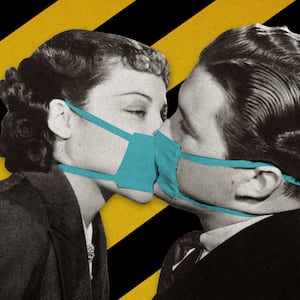As she twerked in front of her computer last Saturday night, someone caught Sarah Sumner’s eye. She was Zoom-ing into The Get Down, a party held online while the country shelters-in-place. One guy danced in his living room without a top on, and the DJ called out his moves.
“I thought, ‘Who is this hot man?’” Sumner, a yoga therapist and friend of this writer, said. “He’s just living his best life, shirtless in his garage, dancing.”
She wanted to privately message him on Zoom but feared coming across as “creepy.” Then, in between shimmies, she stopped to look at her screen. The man, whose name is Noah Lindner, reached out. “I totally have a friend crush on you,” he wrote.
It worked—nearly a week later, the two have gone on a few FaceTime dates, and Lindner attended one of Sumner’s virtual yoga classes. The relationship may be a product of the pandemic, but it began with a staple of life pre-virus: getting flirty.
As nightlife moves online, so have mating rituals. Across the country, people are locking eyes with someone not from across a crowded bar, but through a dirty computer screen.
Tasha Blank, The Get Down’s founder and DJ, put it this way: “We’re all in these little boxes and we know we’re being seen in a different kind of way than usual. That’s exciting for people.”
Blank is based in New York, but currently hosts the party from her parents’ basement in the suburbs of D.C. She’s heard of a few romances blossoming over Zoom. “One of our team members met somebody on Tinder, but they never went out on a date,” she said. “Then the dude showed up at The Get Down! They texted afterwards to say hi. There are cool little connections like that happening.”
Lindner, who is 25 and works as a software engineer in Portland, lives alone and spent the past month in isolation. “The Get Down felt like a magic little happening,” he said. “I was onscreen dancing, and I felt confident, so when I saw this very attractive [girl] dancing, I thought, ‘fuck yeah.’”
When Linder sent his message, he wasn’t sure if Sumner would even read it. “With a new community, you don’t really know what the social standards are,” he said.”You don’t want to make someone uncomfortable. So I said, ‘I have a friend crush on you,’ not, like, ‘You’re hot.’ I wanted to express a platonic interest, so it didn’t turn into a dating app vibe.”
Sumner was into it, but she did admit the message “pulled” her out of the moment. “People were dancing and I was sitting there, bent over my computer randomly with a stupid smile on my face,” she said. “I felt slightly less present, but it was worth it.”
Elsewhere on Saturday night, more traditional club rats—those who enjoy popping bottles and spending money—can find the ecosystem recreated at a “virtual nightlife experience” called Quarantee.
Christian, a promoter from New York who declined to give his last name, founded the event. Entrance is anywhere from $10-$200, depending how many rooms you want access to. One hundred dollars will buy “table service,” a private video chat where people can speak to each other face-to-face.
“One of the big reasons people go to clubs is to meet people,” Christian said. “We cannot deliver the physical aspect of that because there’s no touching, but we can deliver the emotional level, where you talk and engage with each other.”
In the table service rooms, Christian says guests “talk, flirt, and make plans for after quarantine.” He’s not sure if anyone’s used the paid-for privacy to sext. “That’s a good question,” he said. “We don’t really know what’s happening [in there]. Who knows? It’s not like we spy on the tables.”
Brad Allen and Andrés Sierra are two members of the collective behind Club Q, an “online queer party” held every night. The Zoom invite caps off at 1,000 attendees; screenshots of the event show a sea of cool kids in bucket hats, cowboy boots, leather, and mesh. The pop singer Kim Petras and Paper magazine have co-hosted. Guests show up to be seen—and desired.
“We all have needs,” Allen said. “We know a few people who the first nights were in separate squares of our Brady Bunch Club Q interface, and then suddenly they were in one square the next day.”
It’s not uncommon for singles to meet someone on the call and connect for a virtual after-party. “I just saw a missed connections post on Instagram that was like, ‘I saw you at Club Q, your username was Trans Man Big Pecs. I had a pug with me and we had a moment on the dance floor,’” Sierra laughed.
For some, flirting might just be a fun escape from the crippling mundanities of self-isolation. But for LGBTQ folks stuck in an unaccepting household or homogenous hometown, it is a form of survival. “They get to come here and see a bunch of queer people, meet a queer person, even flirt with a queer person—that’s wicked!” Sierra said. “The virtual club bridges that accessibility gap.”
As Allen put it, “It’s nice to know in the middle of this quarantine, when none of us can get haircuts, that we can still catch a dick.”
But, as with real life, virtual come-ons won’t always be appreciated. Blank, The Get Down founder, actually disabled private chats for some of the events, so people don’t have to worry about any unsolicited sexting.
“Our priority is people’s safety and comfort,” Blank explained. “When we do in-person parties, there are people on the dance floor making sure everyone’s being respectful. But we can’t monitor those chats.”
It’s possible to pin one specific person on Zoom, which means their face will be on your personal full screen. That might be a helpful feature for a couple who wants to dance together. It could lead to some light stalking. If a stranger pins someone else’s video, that user will not be notified they’re being watched. (A representative for the software company did not return a request for comment.)
“I think as we explore this new territory and etiquette, it’s polite to ask if you don’t know that person,” Blank suggested. “Just a simple, ‘Hey, can I pin you?’ But of course, we can’t enforce that.”
“Whatever happens, happens,” Sierra said. “If someone’s not interested, you just have to respect that.”
Sumner agreed that she’s cautious when it comes to these meet-cutes. She uses the same Zoom account for work and play, which means her full name is always visible.
“In these really big group things, there is no protection,” she said. “Had I not welcomed [Noah’s] interaction, it would have been creepy. But it did almost feel safer [than a real club] in an odd way, because I don’t have to worry about anyone murdering me, or putting their hands on me. At least I can get a sense of who they are without that being on the table.”
Cora Boyd, a dating coach based in Seattle, suggests “building a rapport” in the group chat before directly messaging someone.
“Just call a little bit of attention to them, something that’s friendly and appreciative,” Boyd said. “Compliment something they said, how their house looks, or a dance move. Or just say they look interesting. Keep it low pressure, and allow them the space to engage back. If they do, chat for a bit, then be upfront with your intentions and give them your information to set up another virtual date.”
The setting isn’t always a bar or club—emboldened college students are also trying it out during virtual class. One of them is Shannon Lambert, a 20 year-old who goes to Smith.
“It looks like a lot of smiling or giggling, but because you can’t tell who you’re looking at over Zoom the same way you can in a classroom, it’s a little more unabashed,” Lambert said. “Some of these people are graduating and I’m never going to see them again. I might as well indulge. There’s no direct consequence like there would be if I had to see them in person everyday.”
Others are less enthused, feeling as if they’re watching a romcom they did not ask for. “People who I never saw interact in real life [suddenly] are the only two people laughing and rolling their eyes, even when the professor is talking about serious things like divorce and widowhood,” Eleanor Brown, who is 21 and lives in Raleigh, complained. “It’s just annoying! It’s not cute at all and it also feels like something I shouldn’t be seeing.”
Sumner and Lindner, who met at The Get Down, have no idea when or if they’ll ever meet in person. But why not keep talking? They’ve got nothing better to do.
Though Lindner pulled off a Zoom pick-up, he demurred when asked for advice. “I have no idea,” he said. “The weird thing is, Zoom is not built for this. It’s a limited opportunity to connect with anyone. But the best advice, I guess, is to just put on a wacky outfit and go crazy.”







